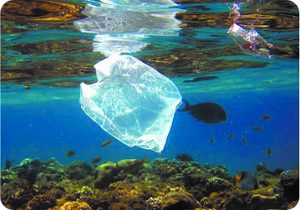It will be the law soon in New Castle anyway!

“One small step for man; one giant leap for mankind.”
These, of course, were the famous words spoken by astronaut Neil Armstrong to mark the momentous occasion of the first moon landing–no doubt, also a personal feat for Armstrong himself. While New Castle residents have yet to journey beyond our planet (if you have, please step forward), a landmark May 31 passing of the New Castle Reusable Bag Initiative–which officially identified our town as the first municipality in the state to pass such a law–constitutes a giant leap too, at least at the local level.
The ordinance, which will officially go into effect on January 1, 2017, will limit the number of single-use plastic shopping bags in a variety of local businesses, encouraging patrons to instead bring their own reusable bag when shopping.
The greenlight comes after an in-depth, two-year study of bag laws in towns across the country, and an equally-lengthy deliberation process, in which Sustainability Advisory Board members worked hard to devise a law that aimed to maximize protection of the environment, while still benefitting local businesses.
Following an additional deliberation period, which included reviewing the law with merchants and residents, getting petitions signed, answering questions, and responding to overall feedback, the final law written by SAB member and RBI initiative leader Jennifer Mebes Flagg, and then, of course, ultimately passed. Needless to say, it’s a decision with which the Town Board is incredibly proud.
“I ran for this position to make a difference,” says Town Supervisor Rob Greenstein, on the subject, “and I feel that by passing this initiative, we have done just that.” In addition, Chairman of New Castle’s Sustainability Advisory Board Steven Wolk praises both the “incredibly supportive” residents of New Castle and the “tireless commitment” of the Town Board, stating that, in passing the law, “[Our] message is clear: [The well-being] of our environment, and ultimately the health of our children, is worth giving up a small amount of convenience.”
Free Bags at First
But any big transition comes with a period of adjustment, and the Board is prepared to handle such circumstances. To ease customers into the change, “We’ll distribute free reusable bags at first,” explains Greenstein, “but the goal is that hopefully, there will be a shift and shoppers will either bring bags on their own, or recognize that a bag may not even be needed.”
As a convenient alternative, stores will offer up paper bags…but in keeping with the effort to be environmentally-friendly and encourage reusable bag use, since paper bags are also highly polluting, they’ll come with a 10-cent charge (kept by the stores to offset the cost of acquiring such bags).
Greenstein, who adds that the change will most impact “the biggest providers of plastic bags” in the area, including Rite Aid, Walgreens, Chappaqua Village Market, and both the incoming DeCicco & Sons (Millwood) and Whole Foods Market (Chappaqua), notes that this ten-cent bag fee will be waived for businesses that mayoffer decorative paper bags for branding purposes.
“I understand the importance for small businesses like gift shops and jewelry stores to have nice paper bags with their name and their logo on it, [and] a design,” he explains. “We tried to respect their right to continue to do that, without having to [charge a fee].”
Additionally, due to the nature of the product and the necessity of the plastic bag, the ordinance would neither affect nor apply to bags for meat and produce, newspapers, or dry cleaning.
No Plastic Bags at All
But for all businesses, plastic shopping bags will be banned entirely. And while some New Castle residents are quick to express dismay, Greenstein urges those opposed to see the positive effects of the decision: “The evidence is overwhelming that this will have a positive impact on the environment.”
Indeed, it’s true. Plastic bags “contribute to climate change, harm our health, and pollute our streets and waterways,” says Wolk. “The problems translate into a giant tax on all residents.” Prohibiting plastic bags would tremendously decrease all these negative impacts.
Furthermore, in the economic sense, “Most people are not going to want to go to Walgreens and pay ten cents every time,” notes Greenstein. “[With this initiative], not only are our residents preserving the environment, but they’re also saving money.”
